Purchasing Your First RV
- Rex Ballard

- May 8, 2020
- 13 min read
Updated: May 10, 2020
Elisa and I have owned several different types of RVs over our 42+ years of marriage. It seems that some sort of RV has played an important role in our lives and the upbringing of our two children our entire lives. Recently, a friend asked me for some advice on what they should consider when purchasing their first RV. This set me off to thinking that it is often a decision that the first time RV'r makes with very little thought and usually carries out on an impulse. In all of our years of purchasing and selling several different types of RVs, I've come to realize that by doing some very thoughtful research up front the first time buyer might save themselves a lot of time, money and potential frustration.
By going through this easy process, I'm sure that you can arrive at the perfect RV choice for you. The answer to each question will then lead you to consider the next issue.
Question 1 - RV Lifestyle
What is RV Lifestyle? I would suggest that the answer lies somewhere on a spectrum that ranges from "roughing it" on the one extreme to "Ritz-on-wheels" on the other end of the spectrum. No matter what type of RV you select, there will be options that span this spectrum. As you might guess, the price varies greatly from one end of the spectrum to the other. The real consideration is about how you want to spend your time while using your RV. If what you really love is the great outdoors and you want to spend the bulk of your time in the outdoors, then perhaps your perfect RV is one step above tent camping. Perhaps what you are looking for is simply a place to sleep that is warm, secure and comfortable. On the other end of the spectrum is total comfort. By comfort, I mean king-sized memory foam mattress, well equipped kitchen, lounge area complete with faux fireplace, color / sattelite tv, surround sound and the cherry on top being a well equipped bathroom with shower/tub combo and maybe even a washer and dryer. You may think I'm exaggerating, but trust me all of this can be found in an RV and more. The price range can start at "Roghing it" at a few $1000 bills to the "Ritz-on-wheels" that can cost over $1million.
Some things to consider when answering this question is to think about how you intend to use your RV most often. Will you be visiting state and National parks with limited amenities, or will you be traveling across the country and mostly staying at well equipped RV resorts. Will you be using it on isolated weekends or will you be traveling for weeks, months or even full-time in your RV. All of the considerations will shed light on your desired lifestyle.


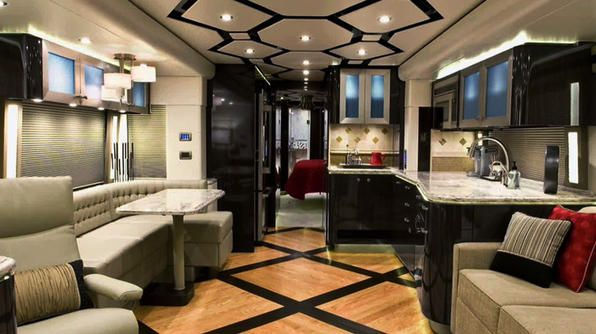
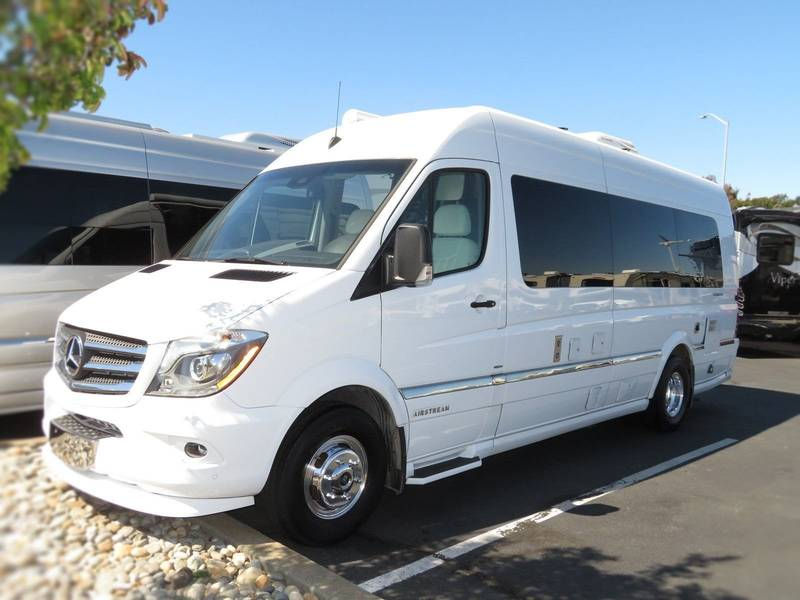

Question 2 - Towable or Motorized
This is one of the first conundrums that the first time RV buyer must consider as most RV's fall into one of these two categories. Having owned both types of RVs over the many years, I can tell you that there isn't necessarily a wrong choice. There are advantages and disadvantages to both and by knowing what type of RV lifestyle you are looking for it may help you to answer this question. Sometimes, the decision is very easy to make. If you already own a heavy duty truck or other type of vehicle that is suitable for towing it is a very important consideration that tilts you heavily toward towable. This is because, by already owning a important part of the RV equation - the means of propulsion, it could have a significant and beneficial cost impact on the second part of the RV equation - the accommodations. If you don't already own a suitable tow vehicle the acquisition cost difference between towable versus motorized can be negligible. The pros and cons on each side of the equation are many and often can be swayed by personal preference.
Towable's come in a variety of "flavors" but are generally categorized as trailers or fifth wheels. They can include small and compact trailers and even expandable trailers with tent sides. They can also include the commonly seen slab-sided travel trailers. Travel trailers can range in size from as small as 8' long to over 40' long. The features can range from spartan to posh and are only constrained by one's pocketbook. Many towable RVs also include slide-outs, which are parts of the RV that can expand outward thereby increasing the amount of living space in the RV. In addition to travel trailers there are what are called Fifth Wheel towable RVs. Thes are travel trailers that connect to the bed of a pickup truck. Fifth wheels offer large amounts of living space and many boast modern amenities like slide-outs. One obvious advantage of a towable is that once you get where you are going, you still have a vehicle to use to visit the surrounding sites. A disadvantage that some people find with a towable is that depending on the length or your RV and the type of tow vehicle you are using, you may find yourself rolling down the road with a combined length of 50' - 60' or more. A fifth wheel that overhangs to the center of a pickup truck bed allows you to tow a much larger RV without increasing the overall combined length of RV plus tow vehicle. Many fifth wheel manufacturers have offset that benefit by building some really huge and long fifth wheels. Some find towable RVs difficult to maneuver especially when it is necessary to back a unit into what might be a relatively tight RV site. Some also find the work that goes into connecting, disconnecting and leveling the towable RV to be a challenge. However, these days, RV manufacturers offer countless optional features that can help make many of these tasks easier to manage.
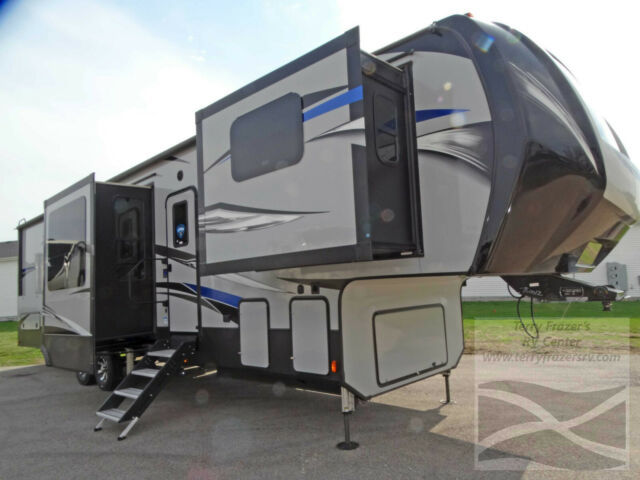
Elisa and I started with tents and then truck camping followed by a towable 24' travel trailer. Our little trailer was very affordable and we were able to pull it with a pickup truck that we already had at the time. We made the transition once we had children and a trailer offered the convenience of a bathroom complete with toilet, sink and shower. With the full size truck the combined length of this travel trailer was close to 50'. Eventually we transitioned to a motorized RV. We started with a Class C type motorhome, which is typified by the RV on the back end being complemented with a van or truck cab on the front end. This is a common transition step from towable to motorhome. The Class C is relatively easy to drive with the ride height and cab width being comparable to a typical tow vehicle. An advantage that some find in a motorhome is that it is easy to load and go. Options such as automatic self leveling, rear facing and side view facing cameras are common features. An obvious disadvantage is that once you get where you are going, if you want to drive to see the sites, you have to a) either tow or drive another vehicle or b) connect and disconnect you RV when you want to travel. When all you want to do is drive to a nice restaurant for dinner, the prospect of disconnecting your motorhome, driving to dinner, finding a place to park it and then reconnecting everything when you get back to your camp site (often after dark) proves to be too daunting. Initially, we solved this problem by having the wife drive a second car behind the motorhome. Later, we transitioned to towing what is called a "dinghy" vehicle. This allows us to both ride together and have the benefit of a second vehicle when we get there. However, this is not a solution without its own set of challenges. Once a dinghy vehicle is connected, it is difficult and sometimes impossible to back the motorhome up while the dinghy is connected. Also, not just any vehicle is suitable for being a dinghy vehicle. Those that are suitable need to be outfitted with specialized equipment that allow it to be connected and towed. This equipment can range in price from $1500 to several thousands of dollars depending on features.
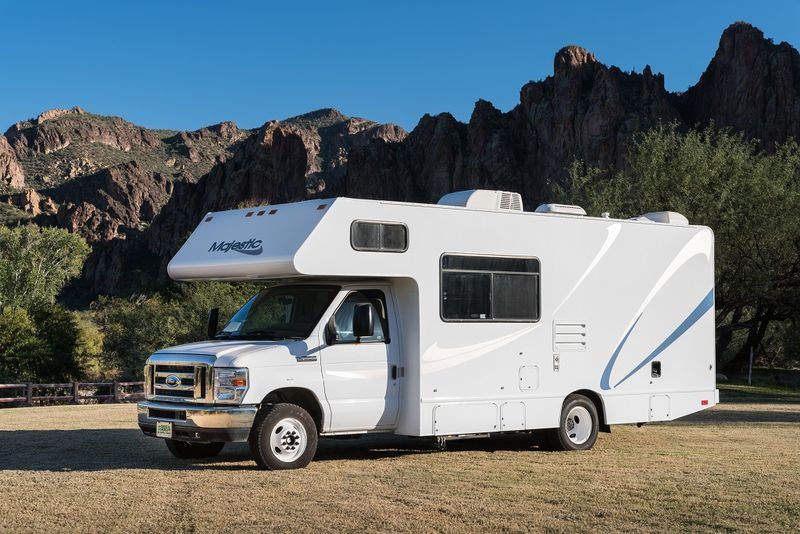

Some people address the issue of having a second vehicle by purchasing an RV that is equipped with a "garage". Just as it sounds, a "garage" is when part of the RV is constructed in a way that motorcycles, ATVs or even small cars can be parked within the RV itself. These are usually referred to as Toy Haulers. Once the garaged vehicles are removed, the garage space can be converted to living space, often with many of the features being dropped down from the ceiling or folding down from he walls.
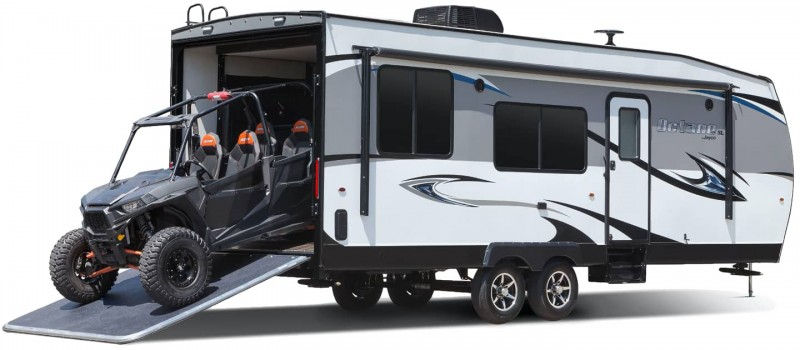
Question 3 - Budget (Used or New)
Once you've decided on the RV lifestyle you are looking for and have answered the towable or motorized questions the next step is to consider budget. A major factor that impacts cost is whether or not you purchase new or used. RVs are a luxury purchase. They shouldn't be regarded as an "investment". I've owned several, and not a single one of them ever appreciated in value. It is not uncommon to experience 30% depreciation in the first year of owning a brand new RV. This is why many people prefer to purchase used. Some disadvantages to purchasing used are that an RV, unlike a car, is a rolling home and owners tend to want to customize their homes and their tastes may not match your own. Additionally, you have to take into account the the prior owner may have been smokers or proud owners of multiple "shed-worthy" Himalayan long haired cats. Notwithstanding those problems, we have had good success, purchasing used RVs by shopping one year old, low usage models. The reality is that many people that purchase RVs have not given serious thoughts about what they were looking for in an RV and once they purchased it, they discovered that it really wasn't right for them. Trust me, there is ample supply of these types of RVs on the market. However, you may need to make some compromises when purchasing used. RVs come in many different shapes, sizes, features and floor plans. It may be difficult to find exactly what you are looking for. Also, the one you find might not be located in your backyard. On two occasions, I've purchased RVs that were several states away. I did this partly to find the right unit but also to take advantage of cost savings that are sometimes available in different parts of the country as compared to California where we live. There are a number of online resources for finding used and new RVs (rv.com, rv-finder.com, rvt.com). Another useful resource is the NADA pricing guide (nadaguides.com/rvs ) that can give you a sense of fair market value for used RVs.
We have also purchased brand new. The benefit of purchasing brand new is that we could pick put exactly the features, options, colors and decor that we were looking for. The first brand new motorhome that we purcahsased was a Sprinter Class C motorhome. That is a motorhome that is built upon a Mercedes Benz Sprinter van chassis. They are diesel powered motorhomes that are very fuel efficient and very reliable. The term "fuel efficiency", is highly relative when it comes to RVs. Our Sprinter motorhome was built by Forest River and was equipped with every available option, including a slide-out that expanded the living area. It included a dedicated sleeping area and a small but well equipped bathroom and it had ample storage both inside and outside of the unit. The Sprinter based chassis allowed us to tow our small vehicle behind the unit and it still averaged between 13 and 16 mpg. We took a 3 month cross country trip in this unit. The main reason we purchased a new unit is that we could not find a used one and locally in the San Diego area the new units were priced at about $110K to $125K as they were in high demand. I happened to find a dealer in Des Moines, Iowa that was willing to order me a brand new unit direct from the factory with every available option. The unit had a sticker price of $121K and I purchased it for $74K. What was the catch? I ordered the unit in November (they don't sell a lot of motorhomes in Iowa during the winter months) and could expect to take delivery in April the following year. We decided that the near $50K savings made the wait suitable. The only other inconvenience was that I had to pick up the unit in Iowa and drive it back to San Diego. The dealer that we purchased the unit through was RVDirect (rvone.com ) and they offer a wide selection of RVs (towable and motorized). You can also order your unit factory direct such as I did.

Question 4 - What Else Should You Consider?
There are a number of other thing that you should consider when selecting your first RV that I will summarize in this section.
A. How often will you really use it?
You may think that you are going to use it every possible weekend and many people do exactly that. You may think that you will take many long and extended road trips and many people do. You may think that you are going to live it it full time, and yes, several people do just that. However, I can tell you that based on my personal experience, you will likely not use it as often as you think you will. Traveling by RV is certainly fun, and it allows you to see the country in a unique way. We love doing it, but it takes a bit of work. It's not as "easy" as hopping on a plane jetting away to an exotic location and relaxing in a nice hotel or resort. It's different and its a difference that some people weren't expecting. We enjoy it partly because I don't mind driving for hours at a time and I'm comfortable behind the wheel of a sizeable vehicle. One of the reasons we have transitioned to a motorhome is that it affords my wife Elisa the opportunity to hop in back, take a nap, use the restroom and even prepare a snack - all without stopping. Some people think that by traveling by RV they are saving money, I would argue that any savings are negligible when you factor in the life-cycle cost of ownership of the RV, cost of fuel and site rental expenses. It is important to realize that traveling by RV is simply different. We like it because it allow us to spend time in places and meet people that we likely would not meet other ways. We like the flexibility RV travel affords us. If we want to stay longer in one place or change destinations we can.
The issue of usage also should weigh into your decision about what type of RV you will get (towable or motorized). If you are only going to be using it a couple of weekends a year you have to take into consideration that a motorhome is a motorized vehicle and it requires care and maintenance whether you use it or not. Fuel stored in fuel tanks for long periods of time can go bad and require the use of fuel stabilizers. Many of the systems on larger motorhomes, such as hydraulic slide-out systems do well with frequent use and do poorly with infrequent use. Similarly, the rubber seals and gaskets on RVs require maintenance and often can be prone to failure through non-use.
B. Where will you store you RV?
Once again, through personal experience, I can tell you that the more difficult it is to retrieve your RV from storage, the less likely you are to use it. I have been fortunate to have a place on my property where I can store my RV. However, my current neighborhood does not allow the parking of RVs on the property, so I have to store it. Initially, where I had it stored made it inconvenient to retrieve. Fortunately, I have been able to secure a more convenient storage place for my current unit. Another thing to take into consideration with regard to storage is the winter-weather conditions where you live. Many of the systems on a modern RV are sensitive to freezing requiring special winter maintenance procedures. Many of these problems can be bypassed if you can secure covered or indoor storage accommodations for you unit. Another benefit of being able to store your RV on your own property is that by seeing this expensive depreciating asset sitting there, it will motivate you to load it up and to take it out on the road.
C. Where will you get your RV serviced?
An advantage of purchasing your RV new and from a large reputable dealer located near where you live, is that you are likely to be able to have it serviced there; both under warranty and afterwards. If you purchase your RV out of state or from out of the area, you may first want to do some research as to where the nearest dealer is that handles the brand and model that you are interested it purchasing. Even, if there isn't one available near where you are located, you will likely be able to find a service center that can meet your needs. I alway prefer being able to take my unit to a service center that is familiar with working on my type of unit.
D. Know your limitations?
It is important to assess your ability and confidence in driving or towing the RV that you select. It is important that you pay special attention to where you will most often be using your RV. If you want to spend all your time in the National Parks, then it is important to realize that most of them have size limits on the type of RV that can safely navigate the park. If this is where you will be spending most of your time you may want to pass on that 40' long Class A motorhome or 45' long fifth wheel. Driving a large class A motorhome or large fifth wheel can be intimidating at first. I remember my first time behind the wheel of a 40' long diesel motorhome, I thought there was no way that it would fit within the lane. However, it does fit and with practice and care, you can become comfortable behind the wheel of whatever RV your select. However, it is important to be honest with yourself and know your own limitations. If you are scared to drive it you are likely not to use it. Many dealers will provide lessons on how to tow or drive your new RV and when it comes to towable it is most important to learn how to back it up safely. Often when it comes to safely driving an RV it is a team sport. It is helpful if your partner/co-pilot is willing to help by checking your blind spots when changing lanes or being a spotter when backing your vehicle up.
E. Should I rent or should I buy?
There are a number of outlets that will rent you fully equipped and provisioned RVs (both towable and motorized). These are very good resource to look into if you aren't sure what you want get. It's helpful to rent one and try it out before you buy. Although rental costs are relatively high as compared to hotel accommodations, it will still likely be lower than the cost of ownership of an RV that you only intend to use for a few weeks out of the year.

I hope this guide helps you find the perfect RV for the lifestyle you are seeking.




Comments